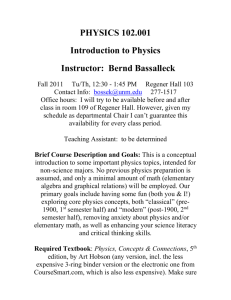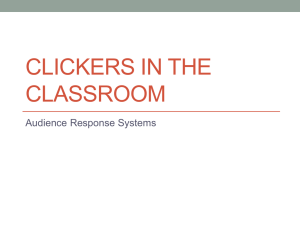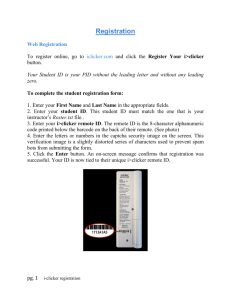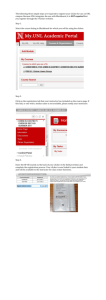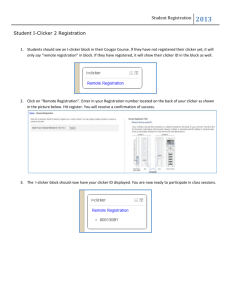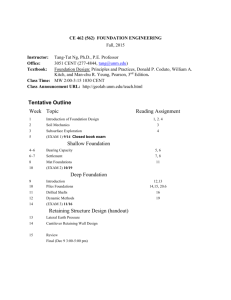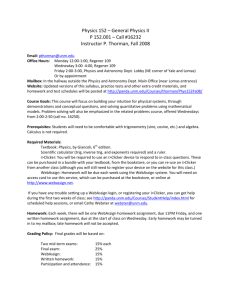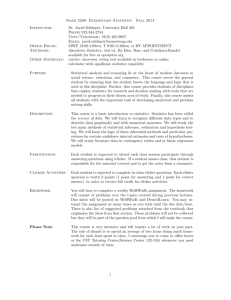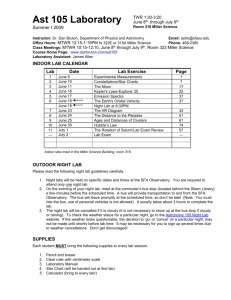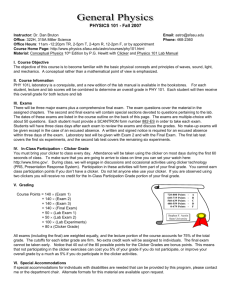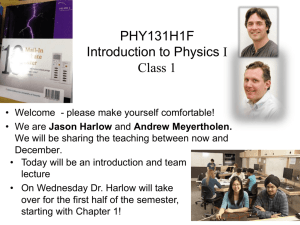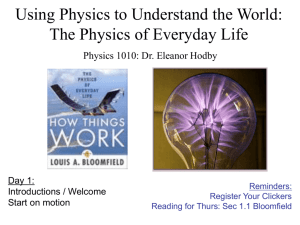Physics 161 - Physics and Astronomy
advertisement
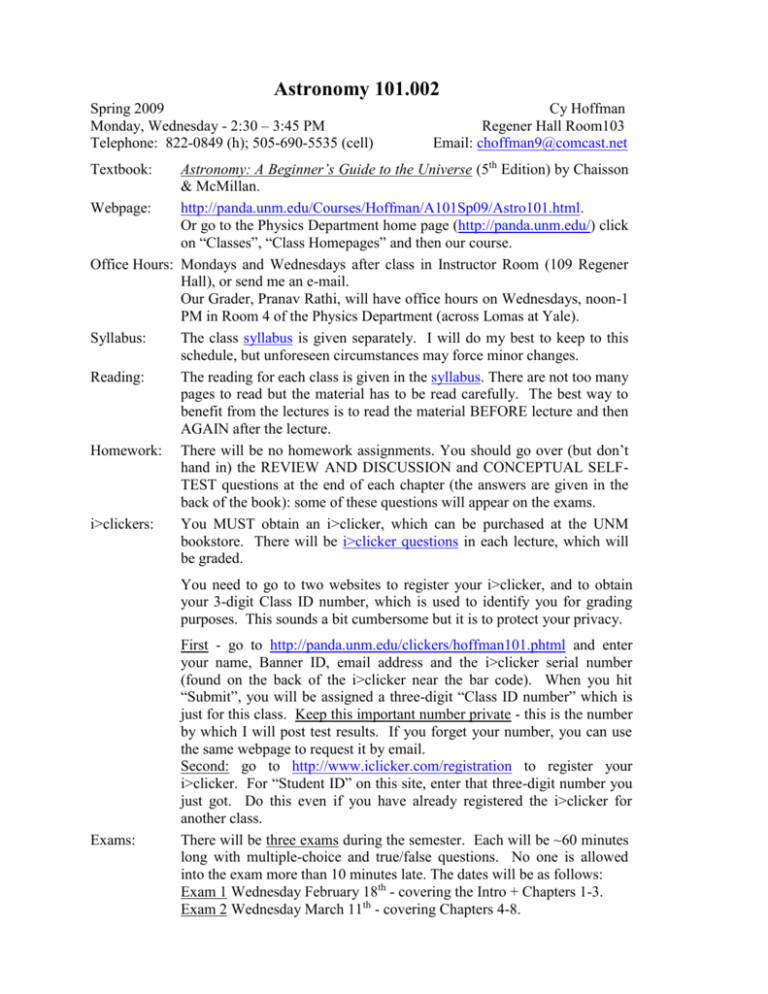
Astronomy 101.002 Spring 2009 Monday, Wednesday - 2:30 – 3:45 PM Telephone: 822-0849 (h); 505-690-5535 (cell) Cy Hoffman Regener Hall Room103 Email: choffman9@comcast.net Astronomy: A Beginner’s Guide to the Universe (5th Edition) by Chaisson & McMillan. Webpage: http://panda.unm.edu/Courses/Hoffman/A101Sp09/Astro101.html. Or go to the Physics Department home page (http://panda.unm.edu/) click on “Classes”, “Class Homepages” and then our course. Office Hours: Mondays and Wednesdays after class in Instructor Room (109 Regener Hall), or send me an e-mail. Our Grader, Pranav Rathi, will have office hours on Wednesdays, noon-1 PM in Room 4 of the Physics Department (across Lomas at Yale). Syllabus: The class syllabus is given separately. I will do my best to keep to this schedule, but unforeseen circumstances may force minor changes. Reading: The reading for each class is given in the syllabus. There are not too many pages to read but the material has to be read carefully. The best way to benefit from the lectures is to read the material BEFORE lecture and then AGAIN after the lecture. Homework: There will be no homework assignments. You should go over (but don’t hand in) the REVIEW AND DISCUSSION and CONCEPTUAL SELFTEST questions at the end of each chapter (the answers are given in the back of the book): some of these questions will appear on the exams. i>clickers: You MUST obtain an i>clicker, which can be purchased at the UNM bookstore. There will be i>clicker questions in each lecture, which will be graded. Textbook: You need to go to two websites to register your i>clicker, and to obtain your 3-digit Class ID number, which is used to identify you for grading purposes. This sounds a bit cumbersome but it is to protect your privacy. Exams: First - go to http://panda.unm.edu/clickers/hoffman101.phtml and enter your name, Banner ID, email address and the i>clicker serial number (found on the back of the i>clicker near the bar code). When you hit “Submit”, you will be assigned a three-digit “Class ID number” which is just for this class. Keep this important number private - this is the number by which I will post test results. If you forget your number, you can use the same webpage to request it by email. Second: go to http://www.iclicker.com/registration to register your i>clicker. For “Student ID” on this site, enter that three-digit number you just got. Do this even if you have already registered the i>clicker for another class. There will be three exams during the semester. Each will be ~60 minutes long with multiple-choice and true/false questions. No one is allowed into the exam more than 10 minutes late. The dates will be as follows: Exam 1 Wednesday February 18th - covering the Intro + Chapters 1-3. Exam 2 Wednesday March 11th - covering Chapters 4-8. Exam 3 Monday April 8th - covering Chapters 9-13. There will be no make-up exams. In determining the course grade, the lowest hour-exam grade will be dropped. Answers to the exam questions will be available at the Exam link. The final exam will be Wednesday May 13th at 3:00 PM. This exam will be 1 ½ -hour long and will cover material from the entire course. Note: cheating or the appearance of cheating will not be tolerated. If you are observed using a cell-phone or computer during an exam, your exam paper will be confiscated and your grade for the exam will be zero. Term Paper: Each student must write a term paper on an astronomy topic related to the course material: the topic will be chosen by the student and approved in advance by me. The length of the paper is not as important as the depth to which the topic is explored and the understanding you demonstrate. The paper is due on the last day of class, May 6, 2009. Grading: The final course grade will be computed from the grades for each of the five course elements, equally weighted: i>clickers, Hour Exams (best 2 of 3), Term Paper, and Final Exam. The final grade will curved so that the class median is ~ B- - C+. Grades: posted here. Extra Credit: Nope. Class Etiquette: Absolutely no cell-phone (including texting) or laptop computer use is allowed in class: turn off your cell-phones and pagers before class. If I see you using one, I will ask you to leave. Please do not eat or talk to your neighbors in class – this is very distracting to everyone. If you know that you must leave class early, please sit near an aisle. Comments: Astronomy is the oldest science. Man has always stared up at the night sky and wondered about it and our place in the universe. We are living in a time of great discoveries about the universe, which are often featured in the media. This course should allow you to become informed enough about the cosmos to understand how these discoveries have been made and what they mean. Astronomy has concepts that are new and foreign to you. The goal of this course is for you to achieve an understanding of many of these concepts and how to think critically. You will not have to memorize a huge amount of material nor use a great deal of math. However, it takes sustained work on your part (and on my part) for you to master the subject. It is important to keep up with the material as it often builds upon itself. I view you as adults, capable of making your own decisions regarding your schoolwork. I will not coddle you or force you to come to class or keep up with your work. However, I am prepared to spend as much time as you request to help you understand the material (or to discuss almost anything else, for that matter). Please do not hesitate to send me an email with questions or comments. Free tutoring for this class is available through CAPS. See http://www.unm.edu/~caps/ for more information.
